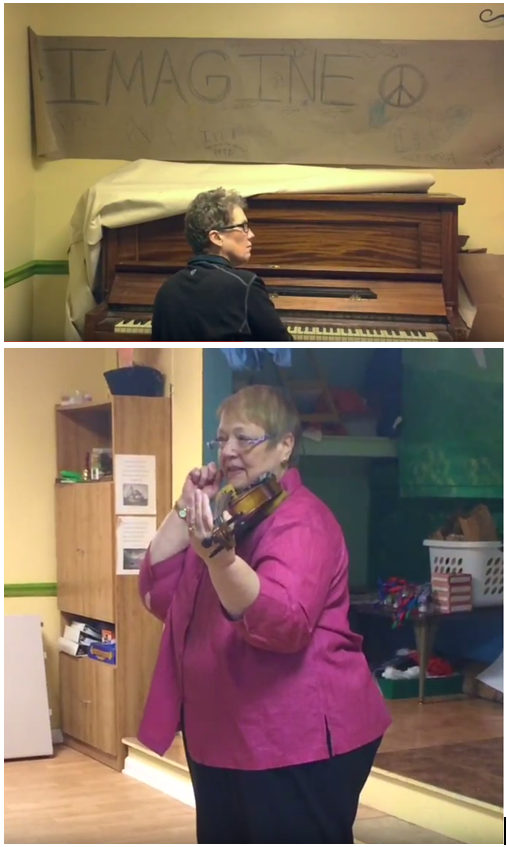Home » News » Can music training improve language outcomes in children? Program for Music, Mind and Society provides violin lessons for children with language impairments
Can music training improve language outcomes in children? Program for Music, Mind and Society provides violin lessons for children with language impairments
Posted by anderc8 on Thursday, February 16, 2017 in News, TIPs 2015.

Natalie Wiens
Written by Natalie Wiens, M.S. candidate in Speech-Language Pathology and Graduate Research Assistant in the Music Cognition Lab
It’s late afternoon and the sun is slanting through the window. Four violins, three children, three parents and one teacher are gathered in a room. As the teacher plays a series of rhythmic notes on her violin, the children imitate and the parents encourage. Soon we see the children initiate and the teacher adapts. This transactional model of learning seems to transcend traditional verbal instruction. Good thing, too, because these three children have a disorder called specific language impairment (SLI). SLI is characterized by a difficulty in processing and producing language that affects approximately 7 percent of children in kindergarten and often goes undetected. It’s important to note that these children have normal IQ and cognitive functioning and do not have autism, hearing loss, developmental delay or any other diagnosis that would otherwise explain poor language skills. These language deficits include vocabulary, word endings (i.e. past tense “-ed”), pronouns (he/she versus her/him), complex sentence structure and narrative/story-telling abilities. SLI can have a large impact on academic performance and quality of life because these linguistic vulnerabilities affect the children’s access to verbal classroom instruction, their development of reading comprehension skills and written word decoding, and their social interactions with their peers.
As a student studying speech-language pathology, I am passionate about finding new ways to stimulate language learning in children with SLI. Currently, research at Vanderbilt is finding a connection between these language abilities that children with SLI lack and their skills related to rhythm. Children who have low scores on grammar tests also tend to perform poorly on tasks of rhythmic perception and production. Both rhythm and grammar have an underlying hierarchical structure and are heavily dependent on the neural processing of timing cues. So what if we could use rhythm as a gateway to improve the language skills of these children? What if boosting the neural pathway for rhythm processing can also help the brain process language?

The scene described earlier with the children and their violins is part of our M.I.L.E.Stone study (Music Impacting Language Expertise), which kicked off “Phase 2” this month. M.I.L.E.Stone is a treatment study that is run by the Music Cognition Lab under the guidance of Dr. Reyna Gordon, and is a part of Vanderbilt’s Program for Music, Mind & Society (MMS). The M.I.L.E.Stone project is examining how a rhythm-based music intervention can help boost speech rhythm and grammar skills in children who have SLI. We currently have three children who are participating with their parents in Suzuki violin lessons as well as a music-and-movement group class each week. The theory behind the music and movement class is that children can learn rhythms through body movements. During activities of marching and musical narratives, the children are trained to become more aware of rhythmic features and to respond physically by associating the rhythm with a kinesthetic action. It is encouraging to see how music can stimulate language transactions between the teacher, the child and the parent. The lessons are taught by Sara Johnson and Lyn Bingham, who are both faculty at Vanderbilt’s Blair School of Music.

The M.I.L.E.Stone instructors: Lyn Bingham, top, demonstrates how music and movement are integrated while Sara Johnson, bottom, instructs the children in Suzuki violin.
We have promising results from our “Phase 1” of M.I.L.E.Stone, which took place this past summer. The participating families enjoyed working with the teacher on developing skills related to music, language and learning. The children with SLI showed improvements in many areas of musical rhythm, speech rhythm and language scores. We look forward to partnering with the Metro Nashville Public Schools in future phases to provide support in identifying children with language impairments, offering opportunities to families for music-based intervention for their children and information about current research for parents, teachers and speech-language pathologists. I am delighted that Vanderbilt’s Program for Music, Mind, & Society can provide musical programs as a resource for families of children with SLI.
M.I.L.E.Stone is only a piece of a broad range of music research within Vanderbilt’s Program for Music, Mind & Society. I recently have worked on creating a video to promote the research and collaboration that is happening within MMS (go follow the MMS Twitter or Facebook page to be among the first to see it when it’s posted!). It has been wonderful to sift through video footage and be reminded of all of the important projects in which Vanderbilt is taking part. MMS is in a unique position to form partnerships between the researchers at Vanderbilt, the musicians in Nashville and the educators and health care professionals working with populations who can be impacted by music. My favorite part of the video-making process has been watching the interviews and testimonials spoken by undergraduate and graduate-level students who work in various research labs associated with MMS. They speak to the excitement that comes from the opportunity to participate in something that is cutting-edge, delivers an impact on people who can benefit from music and shows initiative. These students are taking charge of their own education and are learning information so new you can’t find it in a textbook. This gives me hope — that music is still able to influence the lives of educators, researchers, parents, health care providers and students. And of course, sometimes I like to remember that you don’t have to be anyone special to be impacted by music. That is a privilege shared by all.
One Comment on “Can music training improve language outcomes in children? Program for Music, Mind and Society provides violin lessons for children with language impairments”
David on July 15th, 2018 at 6:41 am
Thanks Natalie Wiens for sharing this. Your thinking process impressed me.
